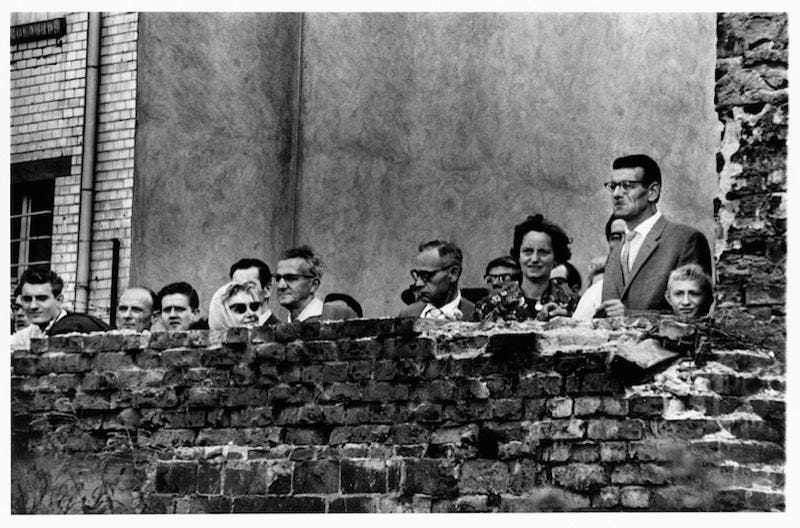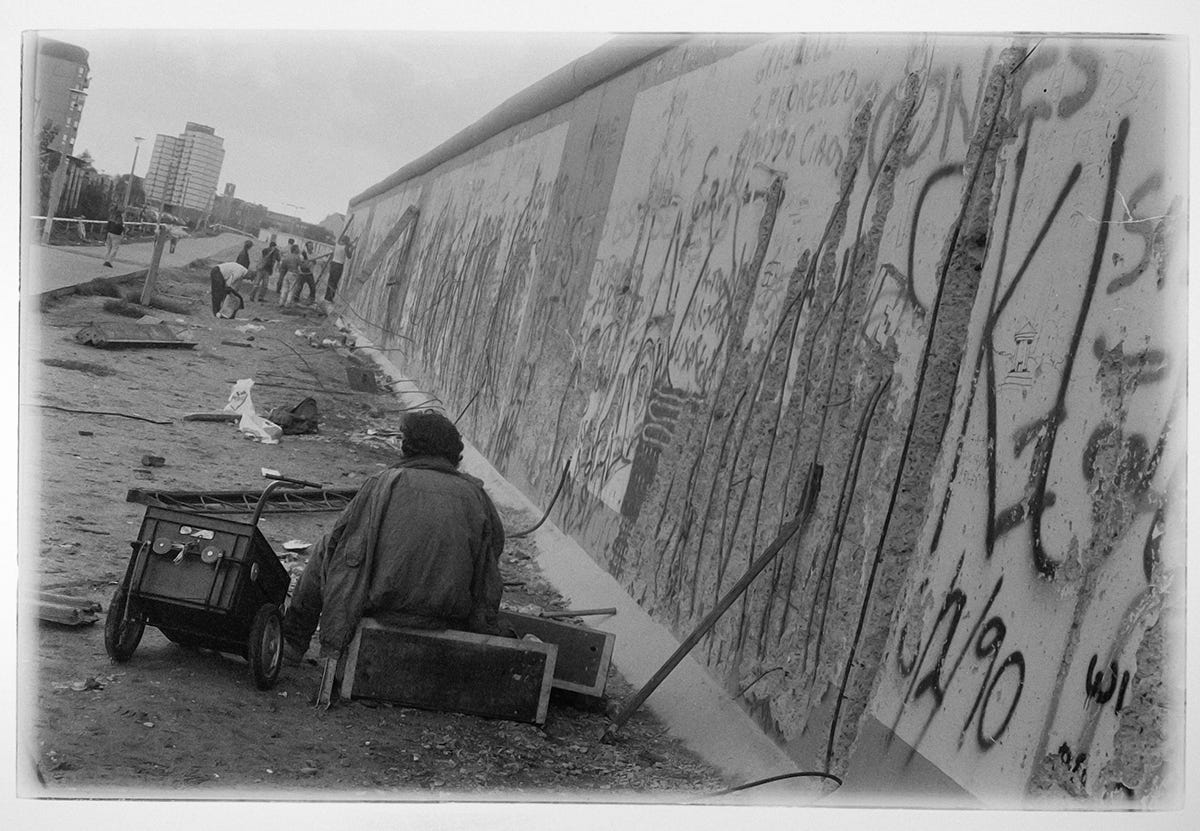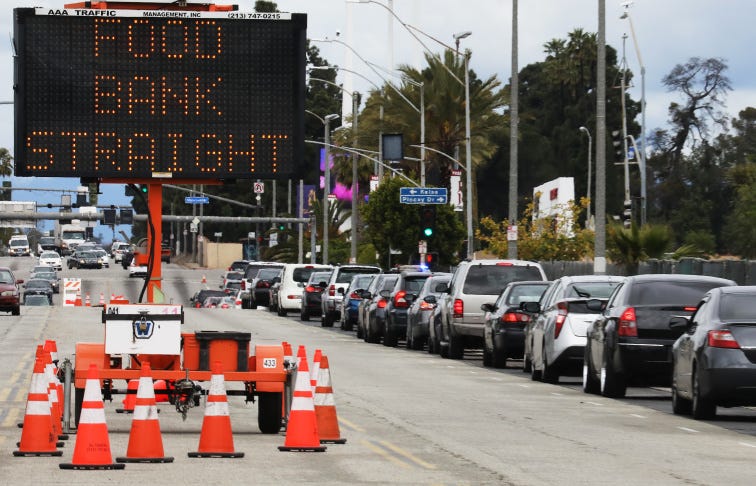Don McCullin, East Germans Looking Into West Berlin, 1961…or, Californians looking towards Texas today?
On a recent episode of his HBO show, Bill Maher dug into Adam Schiff (D-CA).
“I live in California, so I am going to bitch a little bit,” Maher said. “I love California… but I feel like I’m in Italy in the 1970s or something. Super high taxes, potholes in the road… Businesses are leaving in droves. I got solar panels on my roof and it’s been three years and they are still not turned on… I can’t tell you how many inspections. We jumped through every hoop. It’s just corruption.”
I’ve been here for almost a decade and can testify that something has shifted. There’s a boding darkness; a feeling of deep dysfunction and chaotic fury haunts public interactions. Californians aren’t so sunny anymore. We’re increasingly angry. We want to yell at someone.
Maher identifies the symptoms, but not the cause. If only it were corruption we could bribe fix California’s shared spaces. The worst-ever forest fires, the first rolling blackouts in two decades, riots, smash-and-grabs, and a vagrancy crisis that’s been best described as “Hell on Earth.”
The true cause is more insidious than corruption: it’s ideology. It’s a sort of pseudo-religious irrationality that’s bribe-proof, at least without conditions. Placed next to Texas or Tennessee, the failure is glaringly apparent. Hence prominent Californians—Kanye West, Joe Rogan, Chris Hemsworth, Elon Musk, Ben Shapiro—have escaped or threatened to in recent months.
East Berlin, American-Style
Clean, orderly Texas, as seen from California in 2020, looks like paradise. During Soviet control of East Germany, West Berlin may have looked wonderful in the eyes of East Berliners peering over the wall. The thin physical divide between East and West that existed from 1961-1989 tested two approaches to government, capitalism and socialism, side-by-side. It was a contest of one ideology versus another with the wellbeing of its citizens as the score. No excuses. West Berlin thrived. East Berlin failed. In the 28 years that the Berlin Wall existed, 80 people were shot trying to escape East Berlin to go to West. Nobody was ever shot going the other way.
East Berlin and East Germany (GDR) at large failed because their ideologies came before their citizens. German capitalists were concerned with being happy, German socialists were concerned with being right.
Is California East Berlin? No. East Berlin was drab and grey, California is fiery and chaotic. Unlike California, there was almost no homelessness in East Berlin, and there was in West Berlin. Also unlike California, East Berliners had access to cheap housing and cheap food.
But despite being separated by a matter of meters, the GDP of East Berlin was roughly half that of West Berlin. West Berlin enjoyed a thriving economy replete with museums, zoos, theaters, shops, bars, and restaurants. Art and architecture defined the environment. People could seek the jobs they chose and decide for themselves how much effort to put into them.
East Berlin was economically depressed. Life was harsh, cruel, and monotonous. “Most buildings were… nearly identical to each other.” There were food shortages and failed harvests due to poor planning. Meat was rationed, and you were often limited to “cabbages and potatoes.” You had to wait in long lines for luxuries, like your one banana per household per year. When food prices needed to be stabilized, household wares like blankets and towels became scarce. Actual luxury items were available…at 10x higher prices than in West Berlin. A TV would cost 10x a person’s monthly salary. You had to wait years to buy a car.
There were also social abuses. Christians were harassed, churches were banned, and worshipping was restrained. Citizens were bugged and tracked. Foreigners were kidnapped and sent to gulags. And, of course, if you traveled too far West, you were killed. All to prove the premise “from each according to their ability, to each according to their need."
A different, but fundamentally similar far-left ideology dominates California. Like in East Berlin, that doesn’t matter to leaders like Adam Schiff, Kamala Harris, Gavin Newsom, and Eric Garcetti. The ideology comes first, it’s consequences second.
The ideology in question is somewhat hard to affix with a label (The same was true of East Germany… was it Marxism, communism, or socialism?). It can be described as neoliberalism rooted in the principle that the rights of the individual trump all others. To boil it down to a maxim: “the rights of the most vulnerable must be protected at all costs.”
On its own, the maxim is noble and inspiring. But, like Marxism, becomes absurd and dysfunctional taken to its extreme.
Calibomination
Let’s start with our severe public drug use problem, the most obvious and evident signal that something is very wrong. The root cause, instituted by both politicians and legislated from the bench by activist lawyers at the ACLU and judges like Marsha Berzon, is the idea that the drug addicts that now dominate our city centers deserve to have their rights protected, just like the rest of us.
In principle, this is of course true. Homeless people, even those on drugs, deserve dignity and respect…so long as preserving it doesn’t infringe on the dignity and respect of the working-class people who rely on public space. Preserving the public square is quite literally the basis for all civic law, but somehow the interests of the not-most-vulnerable have gotten lost in the calculus. Protecting the most vulnerable, or proving that we protect them, has become our sole objective.
Two court cases in particular beggar common sense: Martin v. Boise and Jones v. Los Angeles invalidated all local laws banning sleeping on streets. The cases, filed by well-funded activist groups like the ACLU, frame homeless people as down-on-their-luck victims of capitalism who suffer the cruel and unusual punishment of being arrested for sleeping on the street when no shelter beds are available.
In the courts, the both decisions prohibit litter disposal; that’s now considered a deprivation of property without due process. Every time police or city workers come across piles of trash, they must mark them and wait several days before removing them, at which point 99% of them have shifted just enough to no longer be in the same location. At least one LA-area officer alleged to me that the ACLU plants activists in encampments to entrap officers who attempt to enforce recently-invalidated laws.
The decisions of Martin and Jones, taken to their logical conclusions, mandate that cities must provide free, taxpayer-funded beds for all of their citizens. They also ban cities from cleaning up their streets—it’s impossible to be certain whether trash left on the streets is litter or property. In effect, they’ve blocked enforcement of virtually any law that would maintain public spaces. The streets have descended into chaos, and the average citizen lost its parks, streets, and sidewalks. LA-resident and Advice Goddess Amy Alkon wrote that her Venice home had been “turned into a prison” by failed policy.
But no matter as long as everyone knows we’re protecting the most vulnerable. Even when a court ordered LA city to clean up encampments near highways, Mayor Garcetti refused citing “ethical issues.”
“There’s ethical issues. There’s health issues. And then there’s just logistical issues,” Garcetti told The LA Times. “I don’t know who could enforce this besides a law enforcement officer. I don’t think I want those images. That’s not good for us. That’s not good for the people who are traumatized on the streets.”
It’s the image, and only the image, that counts.
Blackout the Sun
Ideology is also making fires worse and causing rolling blackouts. Wildfire season in California has evolved into an expected yearly disaster, like hurricane season in the gulf states. This year, we experienced the worst fire season in state history. There are a multitude of causes, but one is ideological: environmental groups have lobbied the state for decades to stop all forest clearing, including timber harvesting, underbrush removal, and controlled burns. People on the ground in fire-prone areas say that naive policies, not climate change, are the true cause.
This year, Californians also experienced rolling blackouts for the first time since 2001. Why? Because green energy resources like solar and wind have daily dropoffs as the sun goes down and wind ceases. In their “rush to go green,” California politicians placed too much of the energy burden on renewable resources, assuming, I suppose, that their good intentions would be enough to power the state. They weren’t, and now California has to scramble to find 10,000-15,000 missing megawatts during peak periods, which means buying them on the open market.
The last time we had rolling blackouts, in 2001, the cause was corrupt deregulation involving Enron. Today it’s the opposite—incorruptable adherence to interminable ideology. Not to be dissuaded by the blackouts, Newsom quickly issued an order banning all gas cars in the state by 2035. How we’ll able to afford Teslas by then is anybody’s guess.
Cry Out for Justice
Perhaps going outside in the heat wouldn’t be so bad if our urban landscapes weren’t facing yet another threat: officially-sanctioned mass protests. In the past several months, entire neighborhood blocks, countless private vehicles, and statues of George Washington and Abraham Lincoln have been destroyed along with hundreds of small businesses, many of whom aren’t able to cash in on insurance policies. Despite canceling family holidays, public gatherings, and religious worship due to COVID, L.A. mayor Eric Garcetti expressed his full support.


Yet again, it’s the public square (and those of us still naive enough to believe we deserve one) that pays the price. As a former resident of DTLA, I saw my neighborhood wrecked four times in a span of six months—the businesses boarding four separate times—and many of them never coming back. The most recent spark? Not a police killing. The Lakers winning the NBA championship.
Facing the highest homicide rate in a decade, Garcetti responded by cutting $150 million from the police budget. Governor Newsom responded similarly: encouraging protests while simultaneously banning religious singing to prevent COVID. Both Newsom and Garcetti have tacitly suggested that protests, unlike other gatherings, don’t spread COVID because everyone wears masks.
Perhaps the most telling example of our prison of belief is Proposition 16, a referendum which the super well-informed people of California will vote on in November. The proposition removes an amendment to the California constitution that “prohibits government institutions from considering race, sex, or ethnicity, specifically in the areas of public employment, public contracting, and public education.” In other words, progressive ideologues now want enable California to discriminate by race and gender to ensure that certain identity groups receive preferential treatment. Governor Newsom supports it.
Ich bin ein Californian
The California ruling class doubles over to prove its loyalty to the woke left. Then doubles again, and again, until the results become absurd like USSR-era bureaucrats so desperate to prove their fragile ideology that it doesn’t matter if everything is broken.
While California doesn’t resemble East Germany, it would appear that dysfunction is operating in a similar way. In East Berlin, there were bread lines—those long waits for your yearly banana. California food pantries are experiencing their highest ever demand. Veteran volunteers say they’ve never seen anything like it. People wait in miles-long lines for days at a time, sitting in their gas-powered cars that will soon be illegal.
The Californian bread line
In November 1989, Berlin Wall fell. No matter how committed its leaders were to its ideology, the real-world results were too strong to deny any longer. But even today, three decades later, East Berlin still feels the punishment. It’s still a tale of two cities; a political terrarium where we can judge the success of opposing ideologies side-by-side.
California is not East Berlin; it isn’t and will probably never be as monotone, rigid, or collectivist. Pioneering and individuality is in our DNA, which means we’ll always be on the edge of something. And even now our leaders are pioneering a certain ideology far beyond anyone’s comfort zone. We can respect their intentions, maybe even their bravery, but at a certain point, we can’t accept the results. And if we’re forced to accept them despite their obvious absurdity and detriment, then we really do risk becoming something as grey and dead as East Berlin. If you tried to leave East Berlin you were shot. That’s not true of California…yet.







Excellent article and an accurate description of California's crisis. Thank you.
Horseshit